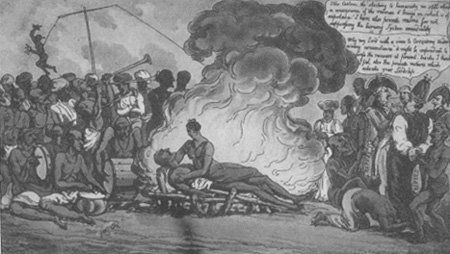William Wilberforce was instrumental in abolishing slavery in Europe. As a parliamentarian in the United Kingdom, he also supported the abolishment of sati in India. By Marvin Olasky, professor of journalism at the University of Texas, and Chief Editor of the World Magazine.
Wilberforce's often complained about those who "either overlook or deny the corruption and weakness of human nature. They talk of frailty and infirmity, of petty transgressions, of occasional failings, and of accidental incidents. (They) speak of man as a being who is naturally pure." Wilberforce contrasted that view with "the humiliating language of true Christianity.
From it we learn that man is an apostate creature. He has fallen from his high, original state. He is indisposed toward the good, and disposed towards evil. He is tainted with sin, not slightly and superficially, but radically, and to the very core of his being. Even though it may be humiliating to acknowledge these things, still this is the biblical account of man." His realistic view of man allowed him to deal with many kinds of disappointment.
Example: As a young man Wilberforce was one of 40 MPs called the Independents who covenanted "not to accept a plum appointment to political office, a government pension, or the offer of hereditary peerage." And yet as years went by, only Wilberforce and one other stuck to that resolution. (Sounds like the Republic Revolutionaries of 1994.) His realism also helped when he faced sharp attacks. James Boswell, famed now for his biography of Samuel Johnson, wrote of Wilberforce, "I hate your little whittling sneer/ Your pert and self-sufficient leer begone, for shame/ Thou dwarf with big resounding name." (Wilberforce stood only 5 feet tall.)
But Wilberforce did not respond in kind. Instead of speaking of his own accomplishments, he often said that one line of prayer summarized his only hope: "God be merciful to me a sinner." Wilberforce emphasized teaching about Christianity but not imposing it, and wrote that Christians should "boldly assert the cause of Christ in an age when so many who bear the name of Christian are ashamed of Him. Let them be active, useful, and generous toward others. Let them show moderation and self-denial themselves. Let them be ashamed of idleness. When blessed with wealth, let them withdraw from the competition of vanity and be modest, retiring from ostentation, and not be the slaves of fashion." He proceeded boldly but not arrogantly, knowing that he could commend belief but not command it.
He stated, "the national difficulties we face result from the decline of religion and morality among us. I must confess equally boldly that my own solid hopes for the well-being of my country depend, not so much on her navies and armies as on the persuasion that she still contains many who love and obey the Gospel of Christ. I believe that their prayers may yet prevail."
Amen.
{moscomment}





